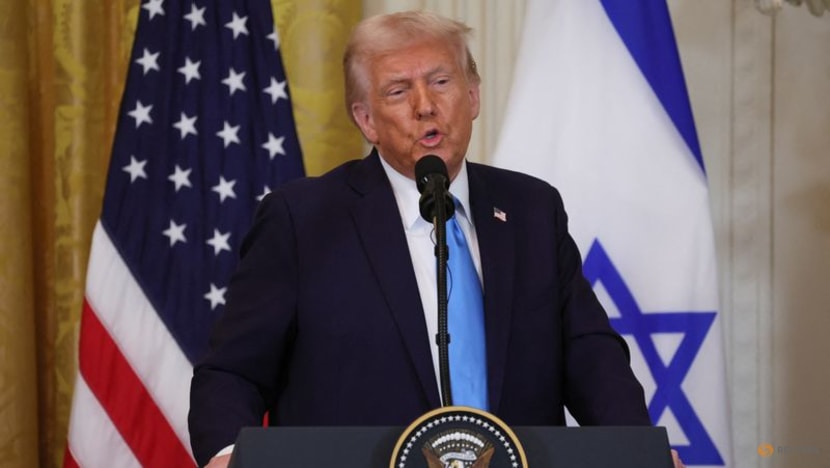Commentary: Trump’s plan for Gaza ‘Riviera’ sounds more real estate pitch than foreign policy
Even if President Donald Trump’s proposal for the United States to “take over” Gaza is never implemented in the way he described, the effects will be overwhelmingly negative and long-lasting, says international security expert Stefan Wolff.

US President Donald Trump speaks during a joint press conference with Israeli Prime Minister Benjamin Netanyahu at the White House in Washington, US, Feb 4, 2025. (Photo: Reuters/Leah Millis)

This audio is generated by an AI tool.
BIRMINGHAM: United States President Donald Trump never fails to surprise. But the bombshell he dropped on Tuesday (Feb 4) during a press conference with visiting Israeli Prime Minister Benjamin Netanyahu was of a completely different magnitude.
He suggested that the US take over the embattled Gaza strip in a “long-term ownership position” and develop it into the “Riviera of the Middle East”. “This could be so magnificent,” he said.
It’s not every day foreign policy sounds more like a real estate sales pitch.
Contrary to his usual reluctance to deploy US forces abroad, he said his administration would “do what is necessary” when asked about sending troops there.
If this wasn’t already enormously controversial, Mr Trump also reiterated that Palestinians currently living in Gaza should be relocated, appealing to countries “with humanitarian hearts” to accommodate them. This is particular ironic and hypocritical, given that Mr Trump on the same day signed an executive order to withdraw all funding from the United Nations Relief and Works Agency for Palestine Refugees in the Near East (UNRWA).
By Wednesday, the White House was already walking back parts of the proposal. But by now, the world should have learnt not to dismiss outright anything Mr Trump says, no matter how outrageous it sounds.
THE MOST EXTREME GAZA PROPOSAL YET
This is by far the most extreme proposal on the future of Gaza and its people ever to be made by a US president - or any other serious political leader. So much so, that even Mr Netanyahu approvingly conceded that Mr Trump was "taking it to a much higher level".
Elsewhere, of course, rejection of what would amount to the ethnic cleansing of over two million Palestinians and another illegal occupation of Palestinian lands was universal.
This may be more of a problem than Mr Trump imagines: Gaza is just one piece in a much more complicated puzzle of US-Middle East policy. Even if the proposal in its current outline is never implemented - and it is hard to see how it could be workable - its effects on the region will be overwhelmingly negative and long-lasting.
For starters, there are now serious doubts on the future of the ceasefire between Hamas and Israel, with talks about the second phase just started.
AN ENVIRONMENT FOR RADICALISATION
In the longer term, the injustice that Palestinians would rightly feel over experiencing another large-scale forced displacement - comparable in scale to the 1948 Nakba - would lead to yet more radicalisation among them.
US occupation of Gaza - already questionable from an international legal perspective - does not confer sovereignty, let alone what Mr Trump calls a “long-term ownership position”. Deportations, in particular, are illegal under the fourth Geneva Convention, to which the US is a signatory.
Even if it were legally and logistically possible to relocate over two million Palestinians, the impact on Mr Trump’s preferred recipients - above all Egypt and Jordan - would be highly destabilising to their social cohesion. It would also strain already struggling public services, potentially beyond breaking point.
At a time when the US has stopped funding for all international aid projects and when humanitarian assistance has generally become less of a priority to many governments in the global north, it would likely condemn millions of displaced people and the communities receiving them to decades of deprivation and suffering. The resulting desperation would be the perfect breeding ground for violence and a rich environment for recruitment efforts by terrorist organisations.
A SPANNER IN THE WORKS OF MIDDLE EAST STRATEGY
Mr Trump’s plan for Gaza also imperils the broader Middle East strategy that he has articulated so far. It clearly does not sit very well with the idea of achieving normalisation between Israel and its Arab neighbours, especially Saudi Arabia.

Even before his shocking announcement on a Gaza takeover, the foreign ministers of Egypt, Jordan, Saudi Arabia, the UAE and Qatar, as well as the Secretary General of the Palestine Liberation Organization, had written to Mr Trump’s Secretary of State, Marco Rubio, and urged him to work with them on implementing the two-state solution for the Israeli-Palestinian conflict that Mr Trump now has all but doomed.
Saudi Arabia’s Crown Prince Mohammed bin Salman condemned it in no uncertain terms, unequivocally ruling out normalisation with Israel in the absence of a viable Palestinian state.
Without Saudi backing, Trump’s other signature Middle East policy - a regional, US-backed alliance against Iran to force Tehran “to make a great deal” - will also struggle to get off the ground.
A return to his maximum pressure campaign against Iran is now certain following an executive order to this effect. But without broader Arab-Israeli rapprochement, the success of this policy will be more limited.
For years, Tehran has managed to exploit the plight of the Palestinians and the lack of Arab support for their cause. Iran has forged an alliance of proxies and enlisted them in the fight against Israel while also mobilising anger among ordinary Arabs and channelling it against the ruling monarchies in the Gulf states.
The regime in Tehran may be weaker now than at any time in the past decade as a result of repeated air strikes by Israel and the wars against Hamas and Hezbollah, but the conditions that allowed it to become a dangerous regional power are still there.
AN ALL-ROUND BAD DEAL
Hamas’ attacks against Israel on Oct 7, 2023 and Israel’s disproportionate retaliation have intensified the salience of the Palestinian cause across the Arab world. Ruling regimes across the region would ignore this at their peril, and Mr Trump will lose valuable US allies if he persists with the plan as he announced it.
At its heart, Mr Trump’s outline of the deal he envisages on Gaza builds on his 2020 plan for the Middle East and the Abraham Accords. But rather than making either of these more workable, it only holds the prospect of more human suffering, alienates important partners and allies in the region and beyond, and potentially commits the US military to the kind of overseas expedition that Mr Trump normally detests.
It is not a policy that makes anyone safer in the region or serves American interests. If Mr Trump is half the businessman he claims to be, he should recognise an all-round bad deal when he sees one.
Stefan Wolff is Professor of International Security at the University of Birmingham and Head of the Department of Political Science and International Studies.



















